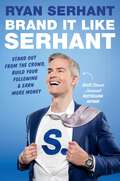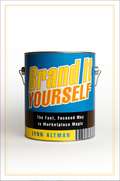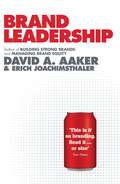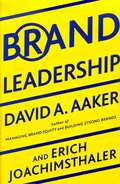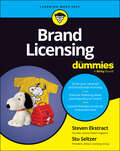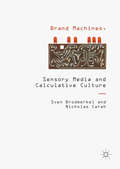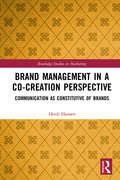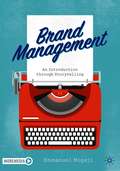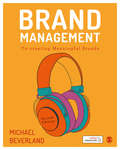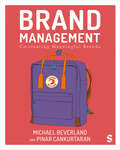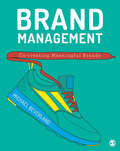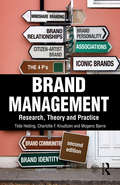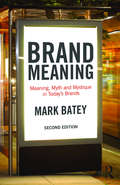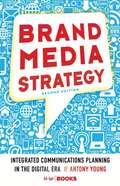- Table View
- List View
Brand It Like Serhant: Stand Out From the Crowd, Build Your Following, and Earn More Money
by Ryan SerhantBestselling author and real estate, television, and media icon Ryan Serhant shares his proven, three-step strategy to build your brand from scratch. Brand is everything. Whether you&’re a real estate broker, a hair stylist, or a freelance contractor, your end goal is the same: get leads and generate new business. You want people to think of you the split second they consider looking for a new apartment, getting highlights, or finally redoing that guest bathroom. And while building a brand from scratch sounds daunting, the authentic you is already a brand—you just might not know it yet.Brand It Like Serhant brings readers through Ryan&’s three-step strategy that transformed him from that-broker-above-Burger Heaven into the founder of SERHANT., the most recognized real estate brand in the world. In Phase One, you&’ll discover your core identity, from your written brand statement to fonts, colors, posing for photos, and more. In Phase Two, you&’ll learn how to deliver consistent content—realistically—by understanding social platforms and making the right choices for your work. And in Phase Three, you&’ll shout it from the mountaintops: share your accolades, leverage growth, and achieve your full potential. Weaving interviews with household names like Gary Vaynerchuk, Rebecca Minkoff, and Mark Manson, custom worksheets to get organized, and a case study of one person&’s progress through each chapter, Brand It Like Serhant is textbook, classroom, and teacher rolled into one. Start to finish, Ryan&’s actionable guide empowers you to build an authentic, enduring brand by becoming known for what you want to be known for—and skyrocket your career.
Brand It Yourself
by Lynn AltmanHow companies can stop overthinking the branding process, with faster and better results Brand It Yourself is about getting a handle on your brand fast-without getting bogged down by research data, focus groups, or company politics. Lynn Altman believes that branding should be an energizing, exciting process. Unfortunately, too many companies turn it into a complicated grind, burying their common sense about how to connect with their customers. Altman and her partner developed the Brandmaker Express process for positioning any brand quickly, simply, and powerfully. She helps her clients tap into their own creativity to overcome the paralysis that often afflicts marketing departments. In Brand It Yourself, Altman shares her experiences helping top global companies develop new products, services, and brand campaigns. She highlights real branding case studies at Dairy Queen, Time Inc. , Brite Smile, and other innovative companies. Winning the hearts and minds of consumers is not as daunting as you might think. With the powerful techniques in Brand It Yourself, your company can develop better branding ideas with less stress and wasted time.
Brand It Yourself
by Lynn AltmanHow companies can stop overthinking the branding process, with faster and better results Brand It Yourself is about getting a handle on your brand fast--without getting bogged down by research data, focus groups, or company politics. Lynn Altman believes that branding should be an energizing, exciting process. Unfortunately, too many companies turn it into a complicated grind, burying their common sense about how to connect with their customers. Altman and her partner developed the Brandmaker Express process for positioning any brand quickly, simply, and powerfully. She helps her clients tap into their own creativity to overcome the paralysis that often afflicts marketing departments. In Brand It Yourself, Altman shares her experiences helping top global companies develop new products, services, and brand campaigns. She highlights real branding case studies at Dairy Queen, Time Inc., Brite Smile, and other innovative companies. Winning the hearts and minds of consumers is not as daunting as you might think. With the powerful techniques inBrand It Yourself, your company can develop better branding ideas with less stress and wasted time.
Brand Leadership
by David A. Aaker Erich JoachimsthalerA dozen management fads have come and gone in the past decade, but brand equity, first explored by David Aaker in the late 1980s, has exploded in importance. Recognized byBrandweekas "the dean of the brand-equity movement," Aaker now prepares managers for the next level of the brand revolution -- brand leadership. For the first time, Aaker and coauthor Erich Joachimsthaler describe how the emerging paradigm of strategic brand leadership is replacing the classic, tactically oriented brand management system pioneered by Procter & Gamble. This fundamental shift involves nothing less than a revolution in organizational structure, systems, and culture -- as the authors demonstrate with hundreds of case studies from companies such as Polo Ralph Lauren, Virgin Airlines, Adidas, GE, Marriott, IBM, McDonald's, Maggi, and Swatch. This immensely readable book provides the brand management team with the capability to:Create and elaborate brand identities (what should the brand stand for)Use the brand relationship spectrum, a powerful tool to harness subbrands and endorsed brands to form brand architectures that create clarity, synergy and leveraged assetsIdentify the customer "sweet spot" and the driving idea that will move brand-building efforts beyond advertising to break out of the clutterUse the Internet and sponsorship to make brands resources work more effectivelyAddress the four imperatives of global brand managementLike David Aaker's two previous bestselling books,Brand Leadershipwill be essential reading for line executives and brand managers in market-driven firms worldwide.
Brand Leadership im Tourismus: Mit starken Marken zum Erfolg
by Marco A. GardiniDieses Buch beschäftigt sich mit der Frage, was starke Tourismusmarken auszeichnet und wie man erfolgreiche Marken im Tourismus aufbaut: Mit welchen Strategien, Techniken und Aktivitäten erarbeitet man sich einzigartige Profilierungs- und Markenleistungen als Brand Leader in seinem Wettbewerbssegment? Wie etabliert man eine Vertrauensbasis zum Kunden und baut sich dadurch langfristige, loyale und damit profitable Kundenbeziehungen auf? Wie schafft man es, mit der gewählten Markenstrategie und den entwickelten Marken für die anvisierte Zielgruppe in der jeweiligen Tourismusbranche relevant zu sein bzw. zu bleiben? Renommierte Autoren aus Wissenschaft und Unternehmenspraxis behandeln diese und zahlreiche weitere Fragen in ihren unterschiedlichen Dimensionen und arbeiten theoretisch fundiert und praxisrelevant die Besonderheiten einer professionellen Markenführung im Tourismus auf. Das Spektrum der Beiträge reicht von theoretischen Grundlagen, Einzelinstrumenten und Methoden der Markenführung, Fallstudien und Umsetzungserfahrungen bis zu Interviews mit Top-Führungskräften aus der Tourismusindustrie. Dieser Sammelband richtet sich in erster Linie an Managementpraktiker und soll den Leser zum Nachdenken, Weitermachen und Weiterentwickeln inspirieren. Das Buch eignet sich aber auch als auch als Grundlage für Vorlesungen zum Tourismusmarketing sowie als Quelle zur Anregung weiterer Forschung im Bereich des Markenmanagement im Tourismus.
Brand Leadership: Building Assets In an Information Economy
by David A. Aaker Erich JoachimsthalerRecognized by Brandweek as "the dean of the brand-equity movement," David Aaker now prepares managers for the next level of the brand revolution—brand leadership.For the first time, Aaker and coauthor Erich Joachimsthaler describe how the emerging paradigm of strategic brand leadership is replacing the classic, tactically oriented brand management system pioneered by Procter & Gamble. This fundamental shift involves nothing less than a revolution in organizational structure, systems, and culture—as the authors demonstrate with hundreds of case studies from companies such as Polo Ralph Lauren, Virgin Airlines, Adidas, GE, Marriott, IBM, McDonald's, Maggi, and Swatch. This immensely readable book provides the brand management team with the capability to:--Create and elaborate brand identities (what should the brand stand for)--Use the brand relationship spectrum, a powerful tool to harness subbrands and endorsed brands to form brand architectures that create clarity, synergy and leveraged assets--Identify the customer "sweet spot" and the driving idea that will move brand-building efforts beyond advertising to break out of the clutter--Use the Internet and sponsorship to make brands resources work more effectively--Address the four imperatives of global brand managementLike David Aaker's two previous bestselling books, Brand Leadership will be essential reading for line executives and brand managers in market-driven firms worldwide.
Brand Licensing For Dummies
by Steven Ekstract Stu SeltzerYour guide to profiting from the world of licensing The brand licensing business is everywhere, turning intellectual property in sectors like entertainment, sports, and fashion into consumer products. Brand Licensing For Dummies offers advice from a pair of the leading experts on licensing to anyone entering the business of connecting content owners with product creators. In this clear guide, you'll learn about the inner workings of licensing and how both licensor and licensee benefit. Discover how to identify opportunities, negotiate deals, market licensed products, and navigate the legalities of licensing. Licensing gurus Steven Ekstract and Stu Seltzer bring decades of experience to this guide, demystifying the world of licensing and teaching you all about the win-win partnerships that allow licensors and licensees to do the things they do best. Discover why licensing is valuable to licensors and licensees alike Explore licensing agreements and different types of deals Learn how to spot a valuable licensing opportunity Negotiate solid licensing deals using the latest strategies This book is a must for brand managers, licensing executives, intellectual property attorneys, product developers, marketing managers, and business owners. Whatever your role, Licensing For Dummies will give you practical guidance, legal insights, and strategic approaches to the dynamic landscape of licensing agreements and intellectual property management.
Brand Love is not Enough: A Theory of Consumer Brand Relationships in Practice
by Max BlackstonHow would you feel about a bank that handled all of your financial needs efficiently, but made you feel like a dummy? In a relationship between two people, what the other person thinks of you (or what you believe they think of you) exerts great influence on the quality of your relationship. The same is true for your relationship with brands. In this trailblazing book, Blackston extends his theory on consumer brand relationships introduced in the 1990s. He introduces a new construct called "brand's attitude," which complements the idea of brand image and introduces a typology of consumer relationships that is richer and more varied than the familiar concept of brand love. This construct describes more fully the two-way street that exists between consumers and brands, and fills a crucial gap in traditional branding literature in explaining consumers’ brand purchasing and usage behavior. Drawing on numerous actual examples and cases from a variety of different industries, and supported by 30 years of consumer data, Brand Love is not Enough should be on the shelf of any serious marketer or student of branding.
Brand Love: Building Strong Consumer-Brand Connections
by Lydia MichaelThe best brands evoke the emotions of their customers by tapping into their hearts and minds.Individuals connect with brands the same way they connect with people. As a marketer, it's your responsibility to cultivate that relationship with your consumers. In this book, marketing and brand strategist Lydia Michael breaks down the process of building culturally inclusive, long-lasting consumer-brand relationships.Brand Love describes how brands appeal to the emotions of their consumers and why everybody benefits when brands earn the love of their customers. The author explains what marketers need to do to make consumers fall for their brands. The book builds on in-depth brand interviews and insights from companies such as Huda Beauty, LEGO and Toyota. She also shares what she has learned through client work and her observations in multicultural settings. Offering insight into the use of emotional and rational drivers, she introduces a "brand love" model designed to inspire brand loyalty and advocacy. With emotional elements such as humanization, personalization and trust alongside rational elements like relevance, differentiation and innovation, the author highlights the best ways to create or reinforce brand love to help your organization remain profitable and a source of inspiration, even during challenging times.Whether you're a marketer for a big or small brand, Brand Love will show you how to capture the hearts of your customers.
Brand Machines, Sensory Media and Calculative Culture
by Nicholas Carah Sven BrodmerkelThis study argues that the defining feature of contemporary advertising is the interconnectedness between consumer participation and calculative media platforms. It critically investigates how audience participation unfolds in an algorithmic media infrastructure in which brands develop media devices to codify, process and modulate human capacities and actions. With the shift from a broadcast to an interactive media system, advertisers have reinvented themselves as the strategic interface between computational media systems and the lived experience and living bodies of consumers. Where once advertising relied predominantly on symbolic appeals to affect consumers, it now centres on the use of computational devices that codify, monitor, analyse and control their behaviours. Advertisers have worked to stimulate and harness consumer participation for several generations. Consumers undertook the productive work of making brands a part of their cultural identities and practices. With the emergence of a computational mode of advertising consumer participation extends beyond the expressive activity of creating and circulating meaning. It now involves making the lived experience and the living body available to the experimental capacities of media platforms and devices. In this mode of advertising brands become techno-cultural processes that integrate calculative and cultural functions. Brand Machines, Sensory Media and Calculative Culture conceptualises and theorises these significant changes in advertising. It takes consumer participation and its interconnectedness with calculative media platforms as the fundamental aspect of contemporary advertising and critically investigates how advertising, consumer participation and technology are interrelated in creating and facilitating lived experiences that create value for brands.
Brand Management In A Week: How To Be A Successful Brand Manager In Seven Simple Steps
by Julia Hitchens Paul HitchensBrand management just got easierSuccessful brands provide meaning: a higher purpose, a vision of a better future, a code of values, and a culture that drives performance. Brands with meaning stand out in their marketplace and attract like-minded people: customers, employees, suppliers and investors. Successful brand management clearly differentiates organizations, products and services from their competitors and inspires advocacy from all stakeholders. Building a strong brand takes much more than a week: it requires an on-going commitment to excellence. This updated second edition of Brand Management In A Week provides a proven seven-day program on the principles of brand management. It takes you from the conceptual and planning stage through to implementation and sustainability. It's packed with tips and insights gained from decades of industry experience to help you jump-start your brand and give you the tools and confidence to manage it through the hurdles of the business landscape.Each of the seven chapters in Brand Management In A Week covers a different aspect:- Sunday: Determine your brand focus- Monday: Define your brand strategy- Tuesday: Express your brand through its identity- Wednesday: Evolve your brand culture- Thursday: Build your employer brand- Friday: The importance of design- Saturday: Sustaining the brand
Brand Management in a Co-Creation Perspective: Communication as Constitutive of Brands (Routledge Studies in Marketing)
by Heidi HansenThis book articulates a new theoretical approach to branding, labelled the Communication as Constitutive of Brands (CCB) approach. This approach combines understandings from the CCO (Communication as Constitutive of Organization) perspective with the branding literature. The author outlines the evolution of corporate branding theory that has developed from an identity approach rooted in signalling theory to an understanding of brands as co-created by multiple stakeholders. She then develops and elaborates the latter approach by formulating and explicating the CCB approach, within which a brand is conceptualized as a discursive brand space grounded in a performative and interactional ontology. Brand discourses are produced in a number of conversational spaces inhabited by both human and non-human actors. Seeing that non-human actors have agency, hybrid agency and ventriloquism are key notions in the CCB approach, and the role of the brand manager is to function as a practical author. The CCB approach is explicated and sustained by five chapters that each elaborate on a certain aspect of CCB and demonstrate the theoretical points in a number of analyses (the process of brand creation, the set-up of conversational spaces, the role of materiality and macro-actors, frame games, and the brand manager as a practical author). The data in the analyses originates from a case that is used throughout the book. Written for scholars and university students within the field of branding and organizational communication, this book represents an area of developing interest within the field of marketing.
Brand Management: An Introduction through Storytelling
by Emmanuel MogajiBranding is an increasingly important part of business strategy for all types of businesses, including start-ups, SMEs, NGOs, and large corporations. This textbook provides an introduction to brand management that can be applied to all these types of organizations. Using story-telling to guide the reader through the main concepts, theories and emerging issues, it offers a theoretical and applied perspective to brand management. Highlighting the relationship between different brand concepts, this textbook explores the role of branding from both a corporate and a consumer perspective and highlights implications for employability and future career options. With case studies, activities, learning objectives and online resources for lecturers, this book is an ideal accompaniment for undergraduates, post graduates or students who have never studied branding before. Written in an approachable way, it gives readers the basics, allowing them to enhance their understanding of the core topics and advance their study further.
Brand Management: Co-creating Meaningful Brands
by Michael BeverlandPresenting the basics of brand management, the book provides both a theoretical and practical guide to brands, placing emphasis on the theory that the consumer is a co-creator in a brand′s identity. In a world in which social media and inclusive digital platforms have increased customer engagement, the role of brands and branding has changed. The line between the producer and the consumer has become blurred; consumers are no longer the recipients of brand identity, but the co-creators, playing a significant role in shaping new products and systems. Case studies include the Canterbury Crusaders, KVD Beauty, Kodak, Yamaha, Ottobock and Holland′s rebrand as The Netherlands.
Brand Management: Co-creating Meaningful Brands
by Michael BeverlandPresenting the basics of brand management, the book provides both a theoretical and practical guide to brands, placing emphasis on the theory that the consumer is a co-creator in a brand′s identity. In a world in which social media and inclusive digital platforms have increased customer engagement, the role of brands and branding has changed. The line between the producer and the consumer has become blurred; consumers are no longer the recipients of brand identity, but the co-creators, playing a significant role in shaping new products and systems. Case studies include the Canterbury Crusaders, KVD Beauty, Kodak, Yamaha, Ottobock and Holland′s rebrand as The Netherlands.
Brand Management: Co-creating Meaningful Brands
by Michael Beverland Pinar CankurtaranThis popular textbook introduces students to contemporary brand management and innovation with a focus on how companies and consumers are interacting and co-creating brands today. The latest edition continues to provide equal focus on theory and practice with all new case studies and examples from brands around the globe to help show the wide range and diversity of brands and consumers today. These include Glossier, Lovehoney, Whisper, Shinola Detroit, Trung Nguyen, Shatta Wale, Tony’s Chocolonely. Also included are updated research references and online resources, as well as a brand-new chapter on the creative aspects of branding from naming to logos and experiences. This textbook is essential reading for all students studying branding and brand management at university level. Michael Beverland is Professor of Brand Marketing at University of Sussex Business School. Pinar Cankurtaran is Assistant Professor of Brand Strategy at the Faculty of Industrial Design Engineering, Delft University of Technology.
Brand Management: Co-creating Meaningful Brands
by Michael Beverland Pinar CankurtaranThis popular textbook introduces students to contemporary brand management and innovation with a focus on how companies and consumers are interacting and co-creating brands today. The latest edition continues to provide equal focus on theory and practice with all new case studies and examples from brands around the globe to help show the wide range and diversity of brands and consumers today. These include Glossier, Lovehoney, Whisper, Shinola Detroit, Trung Nguyen, Shatta Wale, Tony’s Chocolonely. Also included are updated research references and online resources, as well as a brand-new chapter on the creative aspects of branding from naming to logos and experiences. This textbook is essential reading for all students studying branding and brand management at university level. Michael Beverland is Professor of Brand Marketing at University of Sussex Business School. Pinar Cankurtaran is Assistant Professor of Brand Strategy at the Faculty of Industrial Design Engineering, Delft University of Technology.
Brand Management: Co-creating Meaningful Brands
by Professor Michael BeverlandPresenting the basics of brand management, the book provides both a theoretical and practical guide to brands, placing emphasis on the theory that the consumer is a co-creator in a brand's identity. In a world in which social media and inclusive digital platforms have increased customer engagement, the role of brands and branding has changed. The line between the producer and the consumer has become blurred; consumers are no longer the recipients of brand identity, but the co-creators, playing a significant role in shaping new products and systems. To help students better understand the basics of brand management, and the co-creation theory, the book includes a collection of geographically diverse case studies, including: Burger King, Lego, Lynx, Maserati, HSBC and Vegemite. The book is complemented by online resources for lecturers and students, including PowerPoint slides, journal articles, web and video links, and a selection of exclusive videos with a professional brand consultant. Suitable reading for students of branding and brand management modules.
Brand Management: Co-creating Meaningful Brands
by Professor Michael BeverlandPresenting the basics of brand management, the book provides both a theoretical and practical guide to brands, placing emphasis on the theory that the consumer is a co-creator in a brand's identity. In a world in which social media and inclusive digital platforms have increased customer engagement, the role of brands and branding has changed. The line between the producer and the consumer has become blurred; consumers are no longer the recipients of brand identity, but the co-creators, playing a significant role in shaping new products and systems. To help students better understand the basics of brand management, and the co-creation theory, the book includes a collection of geographically diverse case studies, including: Burger King, Lego, Lynx, Maserati, HSBC and Vegemite. The book is complemented by online resources for lecturers and students, including PowerPoint slides, journal articles, web and video links, and a selection of exclusive videos with a professional brand consultant. Suitable reading for students of branding and brand management modules.
Brand Management: Mastering Research, Theory and Practice
by Tilde Heding Charlotte F. Knudtzen Mogens BjerreBrand Management: Mastering Research, Theory and Practice is a valuable resource for those looking to understand how a brand can be conceptualized and thus managed in all its complexity. Going beyond the 'quick fixes' of branding, it offers a comprehensive overview of brand management theories from the last 35 years. A highly regarded textbook, this fully updated third edition brings fresh perspectives on the latest research in, and analysis of, the various approaches to brand management. More than 1,000 academic sources have been carefully divided into a taxonomy with eight schools of thought – offering depth, breadth and precision to one of the most elusive management disciplines of our time. Perfectly marrying theory with practice, this comprehensive text is particularly useful for advanced undergraduate and postgraduate students of brand management, strategy and marketing.
Brand Management: Principles and Applications for Effective Branding (Routledge Companions In Marketing, Advertising And Communication Ser.)
by Jaywant Singh Paurav ShuklaHow are brands created? How can their value be measured? Explore these areas and more with this clear and concise brand management textbook. Brand Management combines practical and real-life applications with a range of perspectives and research insights into the theoretical, societal and socio-cultural contexts to cover all the key aspects of brand management. Exploring areas such as the key definitions and elements of branding, brand loyalty and positioning and brand communication, it offers an easy-to-follow operationalized focus on areas such as measuring brand equity, co-branding and brand architecture. Featuring case studies and examples from Uber, Guinness, Li-Ning, Arm & Hammer, Balenciaga and Netflix, Brand Management also examines new and emerging topics including managing brand crisis, brands' responsibilities and digital brand analytics. It is supported by a range of features such as learning outcomes, 'in practice' boxes, key concepts and discussion questions and online resources consisting of lecture slides, video links and an instructors' manual containing further case studies and exercises.This is an indispensable textbook for undergraduate and postgraduate students of brand management.
Brand Management: Research, Theory and Practice
by Tilde Heding Charlotte F. Knudtzen Mogens BjerreFor more than three decades it has been argued that the brand is an important value creator and should be a top management priority. However, the definition of what a brand is remains elusive. BRAND MANAGEMENT: RESEARCH, THEORY, AND PRACTICE fills a gap in the market, providing an understanding of different 'schools of thought' in brand management and offers deep insight into the opening question of the opening question of almost every brand management course: 'What is a brand?' This comprehensive second edition offers an exhaustive scientific analysis of various approaches to brand management developed over the past thirty years. It also delivers a thorough understanding of the strategic and managerial implications of different brand perspectives.
Brand Mascots: And Other Marketing Animals
by Stephen Brown Sharon Ponsonby-McCabeTony the Tiger. The Pillsbury Doughboy. The Michelin Man. The Playboy bunny. The list of brand mascots, spokes-characters, totems and logos goes on and on and on. Mascots are one of the most widespread modes of marketing communication and one of the longest established. Yet, despite their ubiquity and utility, brand mascots seem to be held in comparatively low esteem by the corporate cognoscenti. This collection, the first of its kind, raises brand mascots’ standing, both in an academic sense and from a managerial perspective. Featuring case studies and empirical analyses from around the world – here Hello Kitty, there Aleksandr Orlov, beyond that Angry Birds – the book presents the latest thinking on beast-based brands, broadly defined. Entirely qualitative in content, it represents a readable, reliable resource for marketing academics, marketing managers, marketing students and the consumer research community. It should also prove of interest to scholars in adjacent fields, such as cultural studies, media studies, organisation studies, anthropology, sociology, ethology and zoology.
Brand Meaning: Meaning, Myth and Mystique in Today’s Brands
by Mark BateyThis second edition of Brand Meaning lays out new territory for the understanding of how brands both acquire and provide meaning. The author draws on his experience with leading international companies to propose a compelling framework for the conscious and unconscious ways in which people connect with products and brands. Revised and updated, it contains contemporary as well as classic examples of brand meaning in practice from various countries, and expands on the theory, methods and applications of brand meaning. The book’s multidisciplinary approach and concise yet comprehensive content makes it an ideal supplemental reader for undergraduate, graduate, and MBA courses, as well as valuable reading for practitioners in the fields of marketing, advertising and consumer research. For more information, visit www.brandmeaning.com.
Brand Media Strategy
by Antony YoungToday's sophisticated media landscape offers more tools and platforms, for the savvy marketer than ever before. Media & brand expert Antony Young explores how today's most innovative marketers are meeting the challenge by employing the latest media tools in ways never before seen to grow their brands, and getting unprecedented results.
